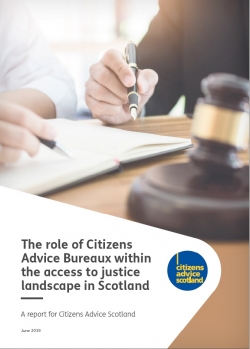
Sarah O’Neill Consulting was commissioned by Citizens Advice Scotland (CAS) to carry out research into the role of the Citizens Advice Bureau (CAB) service within the legal advice/access to justice landscape in Scotland.
The purpose of the research was to describe and explore:
> the nature and extent of the role of the CAB service in Scotland within the legal advice/legal services landscape, in dealing with and resolving people’s civil justice problems.
> the quality assurance arrangements which are in place for the training and regulation/accreditation of CAB advisers and court/tribunal representatives.
> the benefits which the work done by the CAB service in Scotland brings in terms of both the wider public interest and for consumers, including a focus on early resolution/ prevention of escalation of problems.
The report found that the CAB service in Scotland plays a key role within the access to justice landscape, at all stages of a client’s ‘journey’. Hundreds of thousands of people who experience civil justice problems are reliant on its services to obtain access to justice. Bureaux provide vital support to clients who are often vulnerable, and who would find it difficult to access the same level of advice and support elsewhere. The entire justice system is therefore heavily dependent on the services which they offer.
In the words of one bureau manager: ‘if we didn’t exist, I think you would need to invent us’.
CAS commissioned this research because it considered that this was an opportune moment to carry out an assessment of the role and contribution of the CAB service in Scotland. There were two main reasons for this. Firstly, the number of enquiries received by the CAB service has increased over the past year. This reflects the findings of a recent review of advice services in Scotland that there is growing demand for advice, as people who may not previously have required advice are now seeking it due to their reduced income. That review also found that the advice which people need is becoming more complex, and therefore more time consuming. All of this is happening against a background of increasing pressures on public funding.
Secondly, there are a number of external which could result in major changes to the wider environment within which the CAB service operates. Following the recommendations of the Commission on the Future Delivery of Public Services (the Christie Commission), there is currently an emphasis on prevention and early intervention across Scottish Government and public services. As recognised in the Justice Strategy for Scotland, prevention and early interventions improve wellbeing and life chances. This report seeks to describe and assess the major role which the CAB service in Scotland plays in identifying civil justice problems at an early stage; assisting clients to resolve these before they escalate to a formal legal process; and, where necessary, helping clients where their problems have already reached that stage.
At the time of writing, an independent review of the legal aid system has recently been published, while another review into regulation of the legal profession in Scotland is also underway. Both reviews could potentially have a major impact on the role and work of the CAB service within Scotland’s access to justice landscape. Other recent changes which may have a significant impact on the work of the CAB service include the introduction of simple procedure and new rights for lay representatives in court. The UK government’s welfare reform programme is ongoing, while further changes are likely to be introduced as a result of new powers for the Scottish Parliament in relation to both social security and consumer advice.
Given these wide-ranging reforms, CAS considered that this was an important time to carry out an overview of the work that bureaux undertake for clients, to help influence current and future reforms.
Both an executive summary, and the full research report can be accessed via the links below.